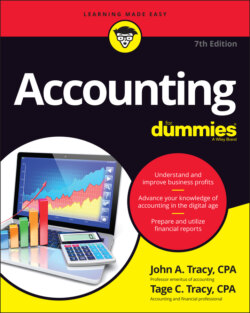Читать книгу Accounting For Dummies - John A. Tracy - Страница 60
Separating the Duties of Bookkeepers and Accountants
ОглавлениеIt’s useful to distinguish between bookkeeping and accounting because they aren’t completely interchangeable:
Bookkeeping refers mainly to the recordkeeping aspects of accounting and is heavily weighted toward processing transactions (for example, billing a customer, paying a vendor, and so on); it’s essentially the process (some would say the drudgery) of preparing documents or managing computer-based digital data entries for recording all the detailed information regarding the transactions and other activities of a business (or other organization, venture, or project).
The term accounting is much broader, going into the realm of designing the bookkeeping system, establishing controls to make sure the system is working well, and analyzing and verifying the recorded information. Accountants give orders; bookkeepers follow them. And we might add that accountants are paid better than bookkeepers.
Bookkeepers spend most of their work time keeping the recordkeeping process running smoothly according to the system established by the business — and they also spend a fair amount of time dealing with problems that inevitably arise in recording so much information. Accountants, on the other hand, have a different focus. You can think of accounting as what goes on before and after bookkeeping. Accountants are in charge of preparing reports based on the information accumulated by the bookkeeping process: financial statements, tax returns, and various confidential reports to managers.
Measuring profit performance is a critical task for accountants — a task that depends on the accuracy and completeness of the information recorded by the bookkeeper. The accountant decides how to measure sales revenue and expenses (as well as any special gains and losses) to determine the profit or loss for the period. The tough questions about profit — how to measure it in our complex and advanced economic environment — can’t be answered through bookkeeping alone. We discuss accounting problems in Chapter 9.
These are the important differences between bookkeeping and accounting. Bookkeeping has two main jobs:
Recording the financial effects and other relevant details of the wide variety of transactions and other activities of the entity
Generating a constant stream of documents and electronic interactions and outputs to keep the business operating every day
Bookkeeping builds up the financial database of the entity. This is a perpetual, nonstop process for a business of any size. A business does bookkeeping every day.
Accounting, on the other hand, focuses on the periodic preparation of three main types of output: reports to managers, tax returns (income tax, sales tax, payroll tax, and so on), and financial statements and reports. These outputs are done according to established timetables. For example, external financial reports are prepared every quarter (3 months) and at the end of the year (12 months). Tax returns have their own timetables, as dictated by the tax laws and regulations. Accountants have much more choice in deciding how often to prepare financial reports to managers. The managers of some businesses require daily or even hourly financial reports; in other businesses, quarterly reports are adequate to keep on top of things.
In this book, we explain the fundamentals of financial reporting to the “outside,” or non-management creditors and investors of a business. The main focus is on the financial statements sent to them (see Chapters 6 through 10). This field of accounting is referred to as financial accounting (although it might be better called external financial accounting). The externally reported financial statements are useful to managers as well, but managers need considerably more detailed information than is reported in the external financial statements of a business. Much of this management information is confidential and not for circulation outside the business. We offer a limited discussion of accounting to managers in Part 4.
